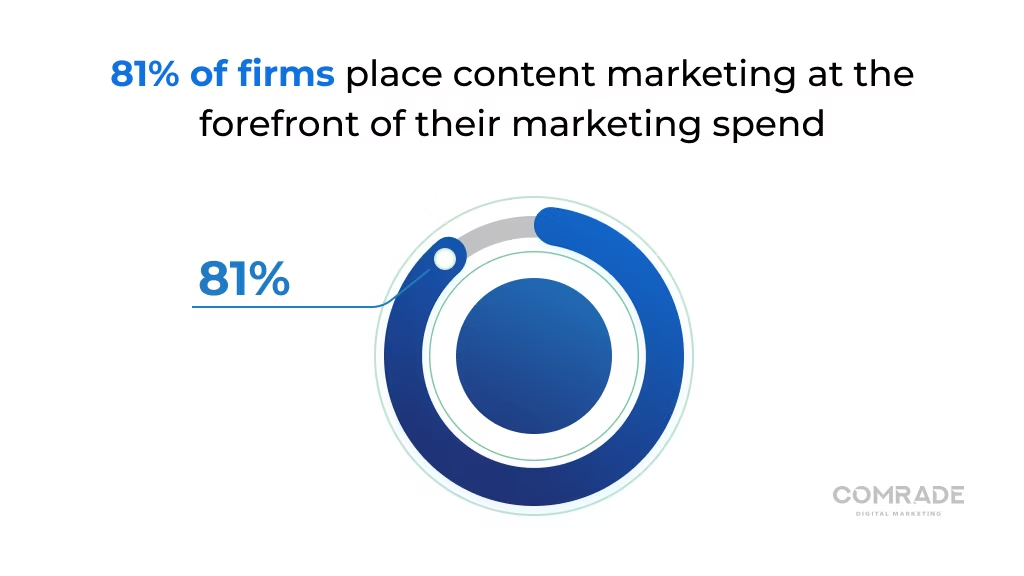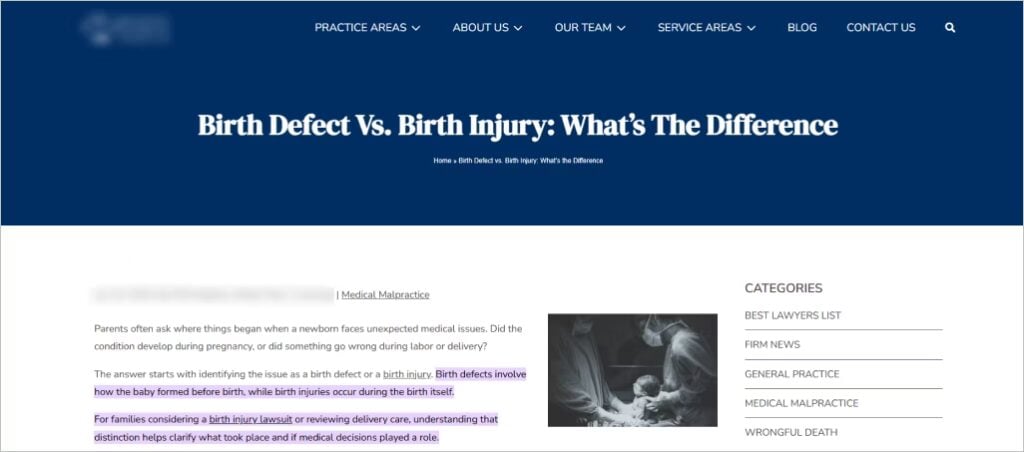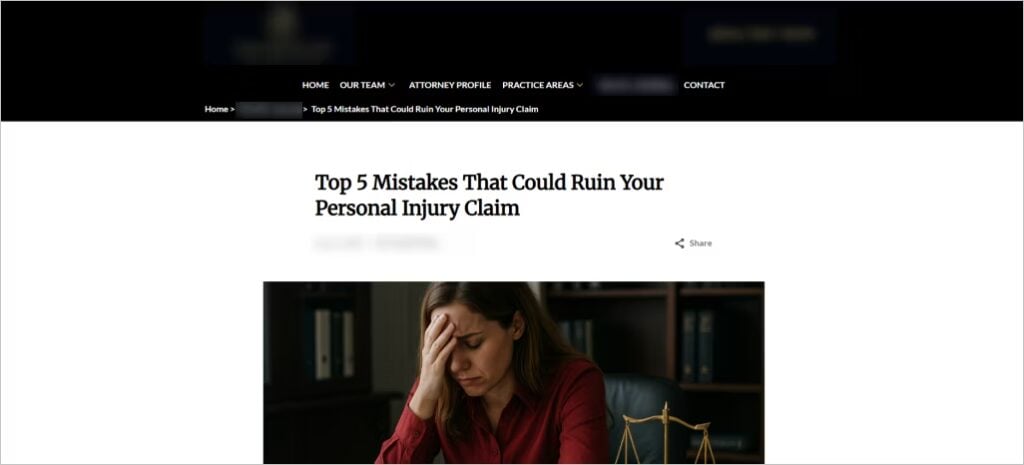Legal expertise might win cases in court, but online, visibility wins clients. Today’s potential clients are searching for answers long before they’re ready to hire — and more often than not, they’re finding those answers on legal blogs. With 77% of people reading blogs regularly and 84% of consumers making purchasing decisions based on blog content, the digital battlefield for legal services is already active.
Yet many law firms remain invisible where it matters most: search results, social feeds, and late-night research sessions. Blogging isn’t just content; it’s client acquisition in action — and it’s one of the few marketing tools that compound value over time.
This guide breaks down 8 blogging strategies that cut through the noise, build trust, and bring in qualified leads. Whether you’re a solo practitioner or part of a larger firm, these approaches will help your expertise reach the people who need it most, before your competitors do.

Why Legal Blogging Isn’t Optional Anymore
Picture this: A business owner gets sued for breach of contract at 9 PM on a Tuesday. What’s their first move?
They don’t call their golf buddy for a referral. They don’t flip through the Yellow Pages. They Google “breach of contract defense lawyer” — and they’re looking for answers, not advertisements.
The Reality Check Every Lawyer Needs

- Law firms see a 97% increase in website links when they consistently publish blog content
- Firms with active blogs see a dramatic 434% growth in indexed web content
- 88% of law firms use blogging as a strategic tool for client growth, highlighting its marketing impact
- 81% of firms place content marketing at the forefront of their marketing spend
If your firm isn’t blogging strategically, you’re not just missing opportunities — you’re actively handing them to competitors who are.
It’s Not Just About Google Rankings
Yes, blogging helps your SEO. But that’s like saying a courtroom victory is just about winning. The real value runs deeper:
- Build trust before the first call: When prospects read your insights on their exact legal issue, you’ve already begun building the attorney-client relationship
- Demonstrate expertise without the hard sell: Your blog showcases your knowledge naturally, without sounding like a late-night TV commercial
- Work while you sleep: Unlike networking events or referrals, your blog content attracts clients 24/7/365
The Competition Has Already Started
While you’re reading this, there’s a lawyer in your city publishing a blog post titled “What to Do After a Slip and Fall in [Your City].” Tomorrow, when someone searches that exact phrase, whose phone will ring?
The game has changed. Blogging isn’t about keeping up anymore — it’s about pulling ahead before the gap becomes insurmountable.
1. Develop a Strategic Legal Content Plan
Walking into court without a strategy is malpractice. So, why approach your blog any differently?
Without a strategy, blogging is a waste of time—and worse, it can confuse your target audience. Content marketing for lawyers should be purposeful, aligned with your firm’s growth goals, and laser-focused on your clients’ pain points.
Define Your Content Mission
Before writing a single word, answer these critical questions:
- What practice areas drive the most revenue?
- Which types of clients are most profitable?
- What questions do prospects ask during consultations?
- What misconceptions cost clients money or freedom?
Your content mission isn’t “to blog more.” It’s something like: “To educate small business owners in Chicago about employment law risks before they become expensive lawsuits.”
Map Content to the Client Journey
Not every visitor is ready to hire — some just realized they might need legal help, others are weighing their options, and a few are choosing their firm right now. Speak to all of them.
Catch attention early with pieces like “Is This Wrongful Termination? 7 Signs You Have a Case” or “Why Your DIY Will Could Cost Your Family Everything.” These spark awareness and build trust.
For those comparing solutions, answer their burning questions: “Mediation vs. Litigation: Which Path Saves You More?” or “How Much Does a Patent Attorney Cost?” Meet them where they’re searching.
And when they’re ready to choose, seal the deal with proof and clarity. Share wins (“Why Our Firm Has Won 89% of Employment Cases”), showcase outcomes, and invite them in with a clear next step: “Schedule Your Free Consultation—Here’s What to Expect.”
Right content. Right time. More clients.
Create an Editorial Calendar That Works
Consistency beats perfection. Publishing one thoughtful post weekly trumps sporadic content bursts. Use tools like Asana, Trello, or even a simple spreadsheet to plan:
- Post topics tied to practice areas
- Publishing dates and deadlines
- Assigned writers or contributors
- Keyword targets and content goals
- Promotion and distribution plans
Pro tip: Batch similar content types. Writing four blog posts about contract law in one session is more efficient than switching between divorce, criminal, and tax law topics.
Measure What Matters
Your strategic plan needs success metrics beyond “more traffic.” Track:
- Organic traffic to specific practice area pages
- Time spent on blog posts (indicates engagement)
- Blog-to-contact form conversion rates
- Phone calls from blog visitors
- Email newsletter signups from blog CTAs
When you treat your blog like a strategic asset instead of a marketing afterthought, it starts delivering the ROI your firm deserves.
2. Perform Targeted Keyword Research to Attract Legal Clients
You could write the most brilliant legal analysis ever published. But if it doesn’t match what your clients are actually searching for? It’s a tree falling in an empty forest.
Smart keyword research for lawyers turns your blog from a digital journal into a client-generating machine. Discover how to identify the phrases real clients are searching for.
Start Where Your Clients Start: Their Problems
Forget legal jargon. Your clients don’t search for “tort reform implications” or “voir dire best practices.” They search for their immediate pain:
- “Can I sue for slip and fall on ice”
- “How long do I have to contest a will”
- “Fired while pregnant California”
- “Do I need a lawyer for first DUI”
Use tools like AnswerThePublic, Also Asked, and Google’s “People also ask” feature to uncover real questions in everyday language.
The Long-Tail Goldmine
High-competition keywords like “divorce lawyer” are expensive and difficult to rank for. But “how to protect retirement accounts in divorce over 50” attracts clients with specific, urgent needs, and less competition.
Target long-tail keywords that indicate:
- Location: “estate planning attorney Buckhead Atlanta”
- Urgency: “emergency injunction lawyer near me”
- Specificity: “H1B visa denial appeal process 2025”
- Intent: “cost of hiring wrongful death attorney”

Analyze Your Competition (Without Copying Them)
Tools like Ahrefs, SEMrush, and even free options like Ubersuggest can show you which keywords are bringing traffic to competing firms.
But the real advantage comes from spotting what they’ve missed — the keywords they rank poorly for, the questions they haven’t answered, the local terms they’ve overlooked, and the emerging legal issues still off their radar. That’s your chance to stand out and get ahead.
Use AI to Accelerate (Not Replace) Your Research
ChatGPT and Claude can generate keyword variations faster than any human. Try prompts like:
“List 20 specific questions someone might Google before hiring a medical malpractice lawyer in Texas, focusing on birth injury cases.”
But verify every suggestion with real search data. AI excels at ideation, not validation.
The “Money Keywords” Every Law Blog Needs
Certain keyword patterns consistently attract high-intent clients:
- “[Legal issue] lawyer near me”
- “How much does [legal service] cost”
- “Do I need a lawyer for [situation]”
- “[Legal process] timeline [location]”
- “Free consultation [practice area] attorney”
Build content clusters around these patterns, creating comprehensive resources that establish your firm as the obvious choice.
Remember: Keywords are just the entry point. Once prospects find you, your content quality determines whether they call or click away.
3. Create Content Focused on Your Specific Legal Practice Areas
Generic legal advice is easy to find — but when someone’s dealing with a real legal crisis, they’re not looking for vague tips. They need a specialist.
That’s why your blog must reflect your core expertise. Strategic legal copywriting ensures every post positions you as the go-to authority in your practice area — attracting the right clients, not just readers.
Go Deep, Not Wide
Instead of writing “Understanding Personal Injury Law,” create practice-specific content like:
- “Motorcycle Accident Injuries: Why Your Case Is Worth More Than Car Crashes”
- “Amazon Delivery Driver Hit You? Here’s Who’s Actually Liable”
- “Birth Injury vs. Birth Defect: Why It Matters for Your Lawsuit”

This targeted approach accomplishes three critical goals: It ranks better for specific searches, attracts pre-qualified leads, and positions you as the go-to expert, not just another lawyer.
Build Topic Clusters Around Each Practice Area
Don’t just publish one page and hope it ranks — build a web of content around each practice area to show Google (and potential clients) you’re the real deal.
Start with a strong main page like “Chicago Medical Malpractice Lawyer”, then branch out with helpful, human-centered articles such as “Surgical Errors: Your Rights When Operations Go Wrong” or “How to Get Your Medical Records for a Malpractice Case.”
These connected pieces create a natural flow for readers and signal to search engines that you know your stuff. The result? More visibility, more trust, and more clients.
Address the Questions Clients Are Too Afraid to Ask
Your intake calls reveal the questions keeping clients awake at night. Turn those into blog posts:
- “Will a DUI Ruin My Nursing Career?”
- “Can My Ex Really Take Half My Business?”
- “What Happens If I Can’t Afford to Pay My Lawsuit Settlement?”
These posts attract clients at their most vulnerable moments — when they’re most ready to hire help.
Localize Your Practice Area Content
“Family lawyer” is competitive. “Fathers’ rights attorney in Portland, Oregon” brings local clients through your door. Localize every practice area:
- State-specific laws and procedures
- Local court requirements and judges
- Regional case examples (anonymized)
- City-specific resources and contacts
Warning: Always verify current law and include disclaimers. Blog posts aren’t legal advice — they’re marketing materials that must still maintain accuracy and ethics.
Show Results, Not Just Knowledge
Clients don’t hire credentials — they hire outcomes. Within each practice area, showcase:
- Anonymized case victories with specific dollar amounts
- Timelines showing how quickly you resolve cases
- Before/after scenarios demonstrating your impact
- Client testimonials tagged to specific practice areas
When your blog content mirrors your actual expertise and results, it pre-sells your services to exactly the right clients.
4. Align Content with the Search Intent of Potential Clients
Writing for search engines is dead. Writing for search intent is everything.
Among the top Google ranking factors for lawyers is understanding search intent—why someone searches, not just what they type.
Blogs that capture this nuance rank higher and convert visitors effectively. Overlook intent, and your site will lose visitors faster than a bounced check.
The Four Types of Legal Search Intent
Not every legal search is about hiring someone right away. Sometimes, people just want answers. When someone types in “What is medical power of attorney?” or “How does child custody work in Texas,” that’s informational intent—they’re trying to understand their situation better. This is your chance to help, not sell. Offer clear, useful explanations and end with a gentle nudge like, “Download our free custody checklist.”
Other times, people already know who they’re looking for. That’s navigational intent—think “[Your firm] reviews” or “Attorney [Your Name] phone number.” They’re trying to reach you directly, so make sure your contact info, bios, and office details are all easy to find and accurate.
Then some are actively weighing their options. With commercial intent, searches sound like “Best divorce lawyer in Miami” or “Top-rated DUI attorney near me.” These people are comparing professionals, so highlight what makes your firm different—credentials, case results, client stories, anything that builds confidence.
Finally, there’s transactional intent—and it means business. Searches like “Hire immigration attorney today” or “Free consultation with a personal injury lawyer” show someone is ready to act. Make the next step effortless with prominent call buttons, easy forms, and fast booking options.
When you understand what people are looking for, it’s easier to show up with the right message at the right time.
Match Your Content Format to Intent
To truly connect with your audience, your content has to match what they’re looking for. When someone’s just researching, offer helpful resources—think detailed guides, clear FAQs, or simple explainer videos. If they’re comparing options, showcase real stories, highlight testimonials, and let your results speak through awards or case studies. And when they’re ready to take action, make it easy with a seamless booking tool, a quick contact form, or live chat that gets them what they need fast.
The “Intent Mismatch” That Kills Conversions
Publishing a 3,000-word guide for someone searching “hire a lawyer now” frustrates readers. Similarly, a sales-heavy page for “what is probate” sends researchers running.
Use these clues to identify intent:
- Question words (what, how, why) = Informational
- “Best,” “top,” “reviews” = Commercial
- “Hire,” “contact,” “consultation” = Transactional
- Action words + “near me” = Transactional
Test Your Intent Alignment
Google your target keyword. What content ranks in positions 1-3? If they’re all guides, don’t create a service page. If they’re all service pages, don’t write a blog post.
Google’s algorithm has already revealed what searchers want. Ignore those signals at your peril.
When you align content with intent, you don’t just rank better — you deliver exactly what prospects need at exactly the right moment. That’s when blogs become client magnets.
5. Organize Your Legal Content with a Clear, SEO-Friendly Structure
A brilliant legal argument means nothing if the jury can’t follow it. The same goes for your blog content.
Even the most valuable legal insights get ignored when they’re buried in walls of text. Structure isn’t just about law firm SEO — it’s about respecting your reader’s time and attention.
The Anatomy of a Perfectly Structured Legal Blog Post
A great legal blog post doesn’t just share information—it keeps readers interested, makes complex ideas easier to understand, and guides them through every step. It all starts with a strong headline. Instead of something bland like “Divorce Information,” use a title that tells readers exactly what they’ll get, like “How to Protect Your Assets in a California Divorce: 2025 Legal Guide.”
From there, use subheadings that do more than break up the page. They should flow like a story, help readers find what they need quickly, and naturally include relevant keywords without sounding robotic.
Keep your paragraphs short and easy to read. White space is your friend—it gives readers room to breathe. And don’t be afraid to use the occasional one-sentence paragraph to highlight something important.
When the content gets dense, make it easier to follow with clean formatting. Numbered steps, short lists, helpful checklists, and comparison tables can turn complicated legal concepts into something anyone can understand.
In the end, structure isn’t just about looking good—it’s about helping people connect with what you’re saying.
Internal Linking That Converts
Every blog post should guide readers deeper into your site:
- Link practice area keywords to service pages
- Connect related blog posts in a series
- Point to the attorney’s bio pages when mentioning expertise
- Always include a path to contact/consultation pages
But don’t overdo it. 2-5 relevant internal links per post maintain flow without feeling spammy.
The “Above the Fold” Formula
The first screen visitors see determines whether they stay or leave. Include:
- A compelling headline that promises value
- A 2-3 sentence introduction that hooks attention
- A brief preview or bullet points of what’s covered
- A relevant image that breaks up text
- A clear indication that more valuable content follows
Schema Markup: Your Secret Weapon
Legal schema markup helps Google understand and feature your content:
- Article schema for blog posts
- FAQ schema for Q&A content
- LocalBusiness + Attorney schema for firm info
- Review the schema for testimonials

This structured data can earn rich snippets that dominate search results.
Mobile Structure Matters More
60% of searches happen on mobile devices. Your structure must work on small screens:
- Shorter paragraphs (1-2 sentences)
- More frequent subheadings
- Expandable FAQ sections
- Thumb-friendly spacing between links
- Fast-loading images
Test every post on mobile before publishing. If it’s hard to scan on your phone, reformat until it flows.
When structure serves both readers and search engines, your content works twice as hard, ranking higher while converting better.
6. Craft Headlines That Capture Attention and Drive Clicks
You have a mere 0.3 seconds to convince readers your headline is worth their time. In that instant, you either hook them or lose them for good.
Lawyers competing in a crowded legal landscape know that effective SEM for law firms starts with compelling headlines. Without them, even the best legal insights go unseen.
Use Emotional Triggers (Ethically)
Legal issues come with strong emotions. Acknowledge them:
- Fear: “5 Mistakes That Could Ruin Your Personal Injury Claim”
- Hope: “How to Get Your License Back After a DUI”
- Urgency: “What to Do in the First 24 Hours After an Arrest”
- Relief: “Yes, You Can Discharge That Debt in Bankruptcy”

Include Numbers and Specifics
Vague headlines get ignored. Specific headlines get clicked:
- Weak: “Understanding Child Custody”
- Strong: “7 Factors Texas Courts Consider in Child Custody Decisions”
- Weak: “DUI Penalties”
- Strong: “2025 DUI Penalties in California: Fines, Jail Time, and License Loss”
Ask Questions Your Clients Are Asking
Question headlines match voice searches and feel conversational:
- “Can I Sue If I Was Partially At Fault?”
- “How Long Do I Have to File a Workers’ Comp Claim?”
- “What Happens If I Can’t Pay Child Support?”
The SEO Balance
Your headline has to win over both people and search engines. Slip your main keyword in naturally, keep it short and snappy—under 60 characters—and put the most important words up front.
Make sure it matches what people are actually searching for, and most importantly, deliver on your promise. Clickbait may generate clicks, but it’ll ultimately backfire with high bounce rates and harm your SEO. Be honest, helpful, and go beyond what you promise.
Test These High-Converting Formats
- The How-To: “How to Protect Your Assets During Divorce”
- The Mistake: “The #1 Mistake People Make After Car Accidents”
- The Ultimate Guide: “Ultimate Guide to Starting a Business in [State]”
- The Comparison: “Chapter 7 vs. Chapter 13: Which Is Right for You?”
Pro tip: Write 5-10 headline variations before choosing. Test which emotional angle resonates most with your ideal client.
7. Showcase Real Case Studies and Client Wins to Build Trust
Legal professionals love to talk about their credentials. Clients only care about one thing: “Can you win my case?”
Case studies and success stories answer that question more powerfully than any degree, award, or years of experience ever could. They transform abstract expertise into concrete proof.
Structure Case Studies for Maximum Impact
Follow this proven format:
- The Challenge: The Client faced wrongful termination after reporting safety violations
- The Approach: Filed OSHA complaint, documented retaliation, negotiated with employer
- The Result: $250,000 settlement, job reinstatement offer, policy changes
- The Takeaway: Speaking up about workplace safety is protected by law
Make It Relatable, Not Just Impressive
Big verdicts grab attention, but relatable situations build trust:
- Show various case sizes (not everyone needs millions)
- Include different practice areas
- Highlight both settlements and trials
- Feature diverse client situations
Use Anonymized Stories Ethically
You can share the impact of your work without crossing privacy lines. Change any identifying details, keep the focus on your legal strategy (not the personal stuff), and make it clear that past wins don’t promise future ones. If possible, get the green light in writing before you share.
Turn Wins into Educational Content
Each case study should teach something:
- “What This Car Accident Case Teaches About Dash Cam Evidence”
- “How One Business Owner Saved $100K Using Proper Contracts”
- “Why This Custody Case Highlights the Importance of Documentation”
Remember: Potential clients aren’t just evaluating your track record — they’re imagining you handling their case with the same expertise and care.
8. Refresh and Optimize Existing Legal Content for Performance
That blog post you published two years ago about marijuana DUI laws? It’s probably wrong now.
Legal content has an expiration date. Laws change. Precedents shift. Google’s algorithm evolves. Yet most small law firms publish and forget, leaving outdated content to damage their credibility and search engine rankings.
Here’s how to transform your archive into an evergreen asset.
Identify Your Hidden Gold Mines
Use Google Analytics and Search Console to find:
- Posts with declining traffic: Need updating
- Posts ranking on page 2: Small tweaks could bump them up
- High-traffic, low-conversion posts: Need better CTAs
- Seasonal content: Update before peak times
Update More Than Just Dates
Don’t just change “2022” to “2025.” Make meaningful improvements:
- Add new case law or statute changes
- Include recent statistics and verdicts
- Expand thin content with more detail
- Add FAQs based on new client questions
- Improve meta descriptions and headlines
Consolidate and Redirect Weak Content
Got a few so-so posts on divorce? Don’t let them drag your site down. Combine them into one clear, helpful guide that delivers. Redirect the old links, update your internal pages, and let Google know you’ve got something better worth showing.
Add Modern Elements
Older posts often lack features that today’s readers expect:
- Table of contents for long posts
- Video summaries or explanations
- Downloadable checklists or guides
- Schema markup for rich snippets
- Updated images and infographics
Pro tip: Set quarterly content audits in your calendar. Refreshing your top 10 posts can deliver more ROI than creating 10 new ones.
Conclusion: Your Blog Is a 24/7 Rainmaker (If You Let It Be)
Blogging is one of the most effective ways for lawyers to connect with potential clients and build trust online. By using the right strategies—like focusing on helpful content and staying consistent—you can position your law firm as a go-to resource in your field and attract more people who need your expertise.
We know that running a law practice is demanding, and finding time to create quality blog content can be tough. That’s why at Comrade Digital Marketing Agency, we’re here to help. We work closely with lawyers to craft smart, results-driven blogging strategies that save you time and bring real growth to your practice.
Whether you’re just starting out with blogging or looking to take your current efforts to the next level, our team has the experience to make your law firm’s online presence stronger and more effective. We’ve helped many law firms increase their online visibility and get more meaningful client leads.
If you’re ready to see what blogging can do for your firm, book a free consultation with Comrade Digital Marketing Agency today. Let’s work together to create a strategy that helps your practice thrive online.
